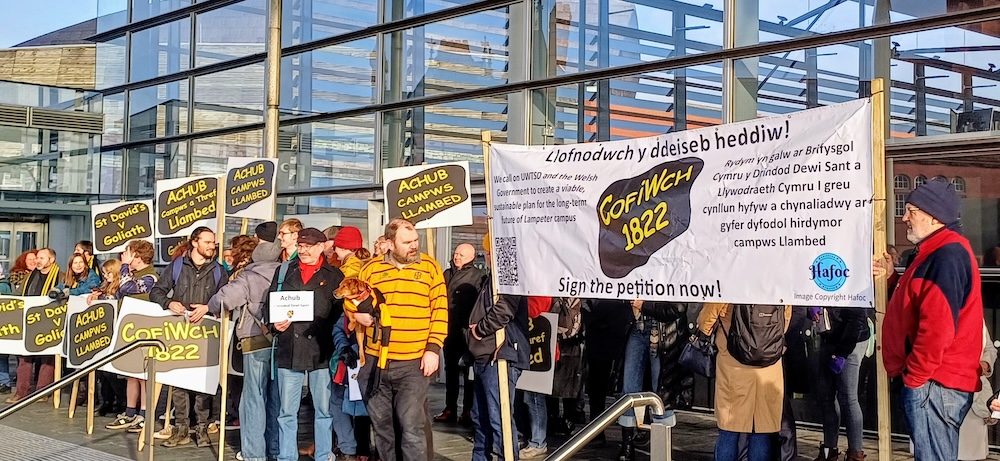Joe Rossiter examines the latest report from the UK Climate Change Committee and what it means for policymakers and the public alike.
Last week, the UK Climate Change Committee (UKCCC) published their latest report on Wales, advising Welsh Government on their forthcoming Fourth Carbon Budget. With a statutory role providing impartial expertise to all UK governments on their progress to net zero by 2050, the report represents another pivotal moment in the nation’s transition.
The report provides guidance to Welsh Government ahead of their Fourth Carbon Budget (a statutory commitment), which will commence in six years (covering 2031-2035). The report presents a possible achievable pathway Wales can take to continue its progress to net zero by 2050. Planning for six years’ time has to start in ernest, impacting the policies and investments we put in place today, to keep Wales on track to meet its legally-mandated target.
Planning for six years’ time has to start in ernest, impacting the policies and investments we put in place today, to keep Wales on track to meet its legally-mandated target.
As with all UKCCC’s Wales reports, the insight is valuable as it clearly spells out what is within Welsh Government’s responsibility and capability to deliver. The net zero transition crosses areas which are both devolved to Wales and reserved to Westminster. As such, the report provides further clarity on what Welsh Government can and should be doing and highlights areas for cooperation with UK Government to deliver at the scale and speed required.
It is also worth noting that previous UKCCC reports on Wales have pointed out that we are reducing our emissions fast enough (we are not on track to meet our targets for the second half of the 2020s and beyond), nor are we on track to adequately adapt our communities for the implications of our rapidly changing climate. As such, an acceleration of delivery is clearly needed, not only from 2031, but from today. Missing current targets only makes reaching future ones harder, and requiring higher investment.
Below is an examination of some of the noteworthy elements of the report and what they mean for the current Welsh Government and those seeking to form the next one in 2026.
Innovative. Informed. Independent.
Your support can help us make Wales better.
Owning the narrative
The UKCCC report makes it clear that Welsh Government now have to grapple with some contentious policy areas, including some which they have significant devolved powers, namely transport, buildings, agriculture and land use.
Much of our efforts to decarbonise thus far have been focussed on tackling industrial decarbonisation. Indeed, as per the report, the energy supply and industry sectors account for ‘more than 90% of the emissions reductions over the first two carbon budgets’ (we are currently in the middle of the second one). As we get closer to 2050, decisions which more closely impact everyday life and concern people’s behaviours will come to the forefront. By the time we reach the fourth carbon budget, ‘contributions from surface transport, agriculture and land use, and buildings become increasingly important, together comprising more than 60% of the emissions reduction required over the Fourth Carbon Budget period.’
When we reach 2031, therefore, the easier wins, that is, policies which require the fewest trade-offs, the least engagement with people and the least investment from government, should have already been implemented and achieved. This will require bigger shifts in everyday life in Wales and a different approach to policy and delivery.
As we get closer to 2050, decisions which more closely impact everyday life and concern people’s behaviours will come to the forefront.
When Welsh Government have already attempted transport and agriculture policies recently, they have been subject to significant public and sectoral pressure. This is most clearly the case with the pushback against some elements of Wales’ Transport Strategy (such as creating a higher bar for new roadbuilding) and with the rollout of the Sustainable Farming Scheme – both of which led to contention and political challenge. Progress on both has subsequently slowed. A renewed political commitment to accelerating the pace of delivery, of nurturing consent for the policy changes to come, and ensuring that communities in Wales tangibly see benefit, will be vital to reinvigorate a sense of optimism about the future of net zero as a long-term, cross-governmental mission.
Political leadership will be increasingly vital as we get closer to 2050, with more interventionist policies needed. This requires embracing the net zero narrative and seeking to cultivate policy support for the transition into a platform for economic renewal.
Land use and agriculture: at a crossroads
Far greater emphasis in the proposed pathway to net zero into the 2030s is placed on addressing a transition in land use and the agricultural sector. Under Wales’ current trajectory, agriculture is projected to be Wales’ highest-emitting sector by the time we reach 2031.
The transition when it comes to agriculture takes two interrelated forms: The first is focussed on minimising greenhouse gas emissions from the sector. The main means of achieving this is by reducing livestock numbers, accommodated by a projected fall in red meat and dairy consumption domestically.
Robust debate and agenda-setting research.
Support Wales’ leading independent think tank.
The second is by increasing the amount of land allocated to nature-based solutions (alongside renewable energy developments), to mitigate Wales’ emissions (both from agriculture and other sectors). These solutions, whether tree planting or peatland restoration, represent tools to create carbon sinks. That is, natural ways of removing carbon from the atmosphere and storing it for the long term. With over 90% of land in Wales used for agriculture, these solutions will require a reallocation of around 14% of this land.
The UKCCC note that rates of tree planting and peatland restoration ‘need to ramp up from today,’ in order to maximise their carbon sequestration potential in the years ahead. Land managers and farmers need to be placed at the forefront of our journey to net zero today as they are expected to mitigate emissions from other sectors’ activities, too. Progress tomorrow in regards to nature-based solutions is enabled (or not) by delivery today.
Nature-based solutions also have a broad range of wider spillover benefits for nature and biodiversity (which is in its own state of crisis in Wales), people’s wellbeing and flood resilience, to name but a few. A Wales with flourishing, sustainable and connected natural habitats is a better Wales.
Achieving this balance in a manner which empowers farmers as a different type of long-term stewards of our land requires a mix of incentives, the right policies in the right place, and an incredible amount of political leadership.
How this solution works practically is, of course, politically contentious, as it represents a repurposing of land, which requires the government to create the conditions for a largescale diversification of agricultural land and associated revenue streams for farms across Wales. Subsidy will therefore be required to shift behaviours and focus towards land stewardship, alongside incentivising sustainable farming practices. ‘Farmers and land managers need to be enabled to adopt the right mix of measures for their land,’ notes the UKCCC. Yet doing so whilst ensuring ambitious targets are hit, as well as providing long-term sustainability of subsidy arrangements, is a tough balance to strike.
Achieving this balance in a manner which empowers farmers as a different type of long-term stewards of our land requires a mix of incentives, the right policies in the right place, and an incredible amount of political leadership.
It is also important to note that this transition is also contentious because it builds on wider frustrations felt by the sector over recent years, exacerbated by post-Brexit payment schemes, the sector’s role in river pollution and most recently the inheritance tax arrangements set by UK Government.
The much-delayed Sustainable Farming Scheme will thus be critical to Wales’ net zero mission not just now, but into the 2030s, as well. We can’t dodge this political hot potato for much longer.
Net zero: an economic issue
Fundamentally, the net zero transition is a pan-economic challenge as the economy sits at the heart of everything. This means convincing people of the wider economic vision, and the belief that investing in electrification powered by renewables will offer lower bills, more security and green jobs spread more evenly across our communities. As such, a third of emission reductions to meet the fourth carbon budget is projected to be achieved through electrification of key technologies.
However, achieving a net zero economy which delivers long-term economic benefits is an argument that is still yet to be won politically. If we are to deliver tangible economic benefit to communities across Wales, then we need governments to be proactive in shaping this transition. Net zero is not inherently economically or regionally redistributive. It certainly offers these opportunities, but we have to create incentives which ensure this is the case.
Robust debate and agenda-setting research.
Support Wales’ leading independent think tank.
Indeed, much of the pathway put forward for the fourth carbon budget represents a shift from emissions reductions from business and government, towards households, primarily through heat pumps and electric vehicles. Left to market incentives alone, however, this transition risks being deeply socially unjust, with those who have the most benefiting the most from lower bills. Only through deliberate policy interventions can we ensure that those who can draw the most benefit, are supported to access new technologies which create safer, warmer and cheaper housing and cleaner transport options. We cannot watch communities in Wales be left behind.
Therefore, we need more detail from Welsh Government on how they aim to incentivise the take-up of net zero technologies by the communities who will most benefit from them. Prioritising these communities will provide the largest wellbeing benefit to Wales as well as spurring a rise in consent for the transition itself. Involving communities whilst ensuring they economically benefit from net zero is vital.
In its initial response to the UKCCC report, Welsh Government states the need to achieve carbon budgets in a manner which is ‘cost-effective, timely and fair to everyone across society,’ utilising the transition as a means to ‘address existing inequalities and improve social and economic justice.’ This is a welcome response, but requires investment at scale to become a reality.
Tata: a worrying precedent
We wrote in 2023 about how the electrification of Port Talbot’s Tata Steel plant was ‘a lesson in how not to deliver a just and fair transition,’ a sentiment that is echoed in the UKCCC report, which notes that lessons must be learnt:
‘The challenges facing the UK steel sector have been clear for many years and, given the significance of this site to the local economy, a more proactive and decisive transition plan should have been developed for Port Talbot.’
The closing of Tata (ahead of the electrification), has had a significant positive impact on Wales’ emissions, with it representing more than half of the nation’s industrial emissions. This has gone a long way to ensuring that industrial emissions are not the main source of GhG emissions by the time we reach 2031.
We need to resume our national public conversation on net zero, planting the seeds for consent, enthusiasm and hope for what this collective mission means for communities in the decades ahead.
Yet, of course, the social costs are deeply troubling. This is not a socially just transition, quite the opposite. The lack of an adequate transition plan for the steelworks, at UK or Welsh Government level, has left a community feeling left adrift. With these scars, net zero will feel like a cost for communities, rather than a benefit – and such reactions would be understandable. They reflect the risk of a lack of support and commitment to net zero and an undermined public confidence in Welsh Government’s commitment and ability to deliver a socially just transition.
Without significant investment, collaboration and cooperation between UK, Welsh and local government, the green economic mission will fail to deliver for communities and will lose political consent. Lessons must be learnt, and a place-based plan for the net zero economy, with adequate investment in skills and community support, must be at the heart of our approach in the decade ahead.
With powers, finances and responsibility for net zero falling across both reserved and devolved governments, we need collaboration and a long-term commitment to realise the economic benefits of net zero to communities across Wales.
Public benefit from private investment
The UKCCC report estimates that the ‘net cost of Net Zero in Wales will be around 0.4% of GDP per year,’ whilst stating that the majority of the investment needed, whether in energy, transport or housing ‘will be private capital.’
Given this, Welsh Government have to create opportunities for the private sector to deliver public benefit. Whilst doing so, we also need to ensure that communities across Wales see meaningful and tangible benefit from investment. One example of how this can be achieved, as the IWA have argued in Sharing Power, Spreading Wealth, is a reformed Community Benefit Funding from renewable energy projects to ensure that wealth is retained in communities.
We also need to create new ways of pooling funding to provide Welsh Government with the fiscal firepower needed to make meaningful investments which can alter Wales’ economic performance. This is at the heart of our calls for a Wales Wealth Fund, which would pool a percentage of profits from renewable energy projects in order to further invest in publicly-owned renewable developments. It is also promising to see Welsh Government taking equity stakes in community-owned marine energy projects, thus supporting community energy and ensuring long-term economic benefit to the people of Wales. Such an approach can enable Welsh Government to attract investment whilst catalysing further future investment.
Ensuring a high degree of local and community ownership of large-scale projects is crucial to ensure that communities across Wales see tangible and sustained economic benefit from net zero. Doing so can build consent and enthusiasm for our collective net zero journey.
Discussions and debates that drive Wales forward.
Join Wales’ leading independent think tank.
In summary
This report presents a path forward for Welsh Government policy in order to achieve net zero by 2050. Many of the targets and asks are ambitious, yet realistic.
We need to resume our national public conversation on net zero, planting the seeds for consent, enthusiasm and hope for what this collective mission means for communities in the decades ahead. We must deliver with communities rather than for them as well as weaving a narrative of hope for the future, rather than constricting it.
Work must be done to translate the technical into the political. That is, an offer to the public which uses net zero to improve their lives and wellbeing. We don’t do this by making net zero a technical issue that needs fixing, nor by not shouting about the progress we are making. Instead, we need to engage directly with why net zero is a positive endeavour which can bring meaningful wellbeing benefits to all. A future in which people in Wales are flourishing, rather than floundering.
Big political arguments will need to be won over the coming decade, on land use, our diets, how we travel, how we heat our homes and many others. Behavioural shift continues to frame the backdrop of many changes. Government thus cannot afford to vacate the pitch on these issues, but needs to continue to ensure that communities benefit from the transition and that they articulate a clear pathway forward.
With consequential Senedd elections coming next year, we hope that parties can show such leadership, prioritising the opportunities afforded by net zero: the opportunity of a green economic revival.
All articles published on the welsh agenda are subject to IWA’s disclaimer. If you want to support our work tackling Wales’ key challenges, consider becoming a member.





